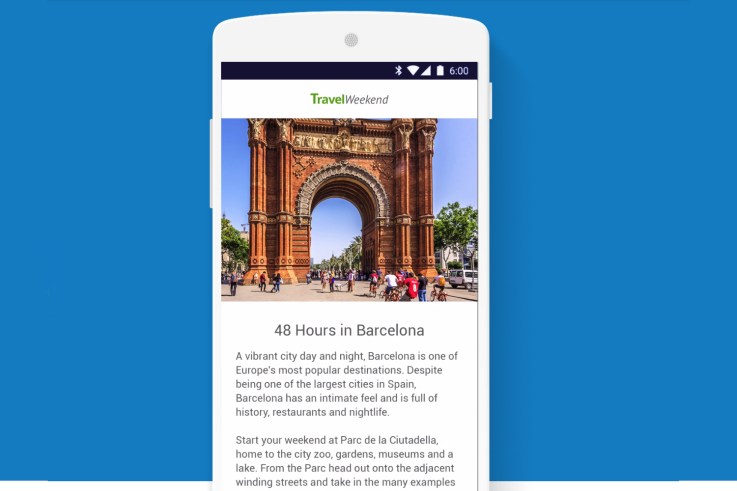
Google’s plan to accelerate the mobile web – also known as the “Accelerated Mobile Pages Project” or AMP, for short – now has a launch date. The company said this week that it will begin directing traffic to its sped-up AMP pages in Google Search starting in late February
2016. In addition, Google notes that Pinterest is already testing AMP pages in its mobile apps, while both Twitter and LinkedIn will begin linking to AMP content in early 2016, as well.
2016. In addition, Google notes that Pinterest is already testing AMP pages in its mobile apps, while both Twitter and LinkedIn will begin linking to AMP content in early 2016, as well.
Google also said it has added a number of new partners to the project, including messaging apps LINE, Viber and Tango.
AMP was first announced this October as an ambitious project aimed at making the web more usable on mobile devices. The problem with the mobile web today is that publishers’ sites have become bogged down with extraneous code, like ads, tracking scripts, fonts and more which slow down page load times. Facebook has addressed this problem through “Instant Articles,” which load stripped-down versions of posts directly in the News Feed. And Apple now lets iOS users block ads and other content within mobile Safari.
Google, like Facebook, is taking the partnership approach with AMP and is working with publishers, technology companies, analytics providers and ad firms to support AMP pages. As an open source initiative, AMP involves a new, open framework called AMP HTML that’s based on existing web technologies, but designed in a way to load pages much more quickly even when they contain rich media, animations, videos, and things like YouTube, Vine, or Twitter embeds.
The company has already lined up dozens of partners in support of its efforts, including many of the publishing industry’s biggest names like The WSJ, The NYT, Huffington Post, BuzzFeed, The Washington Post, BBC, The Economist, FT, Vox Media and many others. Google says now it’s adding support from publishers in developing markets, including places like India, Mexico, and Indonesia. It has also added Fox News in the U.S.
Google provided an update on some of its partners’ plans to roll out AMP support, noting that WordPress will support all publishers who want to enable AMP pages beginning in January. Meanwhile, analytics companies comScore, Chartbeat, Google Analytics, and Parse.ly will have AMP support in their tools by late February, the company says.
Early tests of AMP seem to be promising in terms of the end user experience.
Pinterest, which is testing AMP pages in its iOS and Android apps, found that these pages load four times faster and use 8 times less data than traditional mobile-optimized pages, Google stated.
Google will make further announcements about new partners and their specific launch plans over the weeks ahead, it said.
